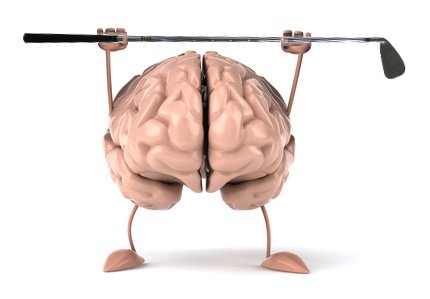
Golf is a game that is at once exhilarating and frustrating. The possibilities for perfection excite the player, but the game has the uncanny ability to expose weaknesses of mind and character of the player too.
The player must learn to accept the challenge to play golf's inner game in order to achieve a modicum of success. She must not only recognize the hazards of OB markers and sand traps, but the existence of mental hazards as well. Many players vow to quit the game because of internal and external frustrations, but few actually do quit. The game of golf is quite alluring because of the possibilities to swing like the pros. And many novices are able (on occasion) to do just that. The frustrations lie in the fact that repetitive success is hard to achieve at will. Hence, what is agonizing about the game is its manner of inconsistency. The good news is that, with a little discipline, a player can achieve the mental attitude necessary to improve.
Precision can be achieved through the positive manner in which one approaches the ball. Most professionals seem to approach the ball with great self-discipline. This should be the goal of the novice as well. Consistency in one's approach is important. Every single time, approach the ball with a calm nature. Everyone knows that golf does not allow for the release of pent up frustration. The next shot must be achieved with a kind of 'quiet' attitude. This calls for one to understand the inner game of golf as well as the outer game.
The game brings with it the pressure of knowing one has to make every shot count because golf does not allow for many mistakes. And, because golf is a game one plays against herself (as well as others), the inner game becomes intensified, i.e. the ego is challenged and threatened. Many times, this pressure can cause the player to perform poorly, yet it is just this kind of pressure that attracts one to the game in the first place.
The best golfers realize that there is no one tip or strategy that can prepare them for each challenge. They realize that good golf is achieved through patience and practice of inner and outer game skills. If a shot is poor, the player has a tendency to overanalyze what went wrong. If the shot is good, the player spends a lot of time thinking about how to repeat it. But the best golfer's know how to clear the mind, regardless of external factors.
The biggest secret to golf is learning to control one's mind. When this is achieved, the body naturally relaxes, allowing for a better shot.

The Inner Game of Golf – Mental Approach and Attitude
What is the biggest challenge you face on the golf course? When asked this question, the average golfer will turn to any one of a number of common answers. Some golfers think the sheer distance of the course is their biggest obstacle, while others think it is the hazards that are littered throughout the layout. Or, some golfers will point to one specific physical part of the game, such as driving or putting. While all of those points certainly can contribute to additional strokes on the scorecard, we would argue that none of them is the biggest hurdle you need to clear.
Rather, we think the biggest hurdle that you need to clear is between your ears. The mental game is a huge part of your success – or failure – in golf, yet most people completely ignore this topic. Thinking that they simply need to make better swings in order to shoot lower scores, most players work exclusively on technique. That is a mistake. If you are willing to become one of the few players who works harder on your mental game than you do your physical game, you just might be amazed at the results.
In this article, we are going to talk about the game that takes place inside your own mind. That means we are going to discuss your mental approach to golf, the attitude you take with you on the course, and the way you think about the game in general. At first, these concepts are going to seem rather abstract, and it won't feel like they have much of a direct connection to your scores. You will learn as we go, however, that the way you think about your game is directly connected to the score you write down at the end of the day. Golf is a complicated game, and there are many factors to consider when thinking about your level of play. Yes, the way you swing the club matters, but so does the way you think while making those swings. And, it is even important to control the way you think between shots. The golfer who possesses a great mental approach and attitude throughout each round is going to start with a major advantage over the player who has never even thought about such topics.
It should be stated right here at the start that making changes to your mental approach is not going to be easy. Believe it or not, it will actually be easier to make changes to your physical game than it is to make changes to the mental side of things. The mental habits you have established on the course are deeply rooted at this point, and they are not going to go down without a fight. To make positive changes in this area, you are going to have to be committed to the process. Don't expect results right away – but do expect powerful improvements as time goes by.
All of the content below is written from the perspective of a right-handed golfer. If you happen to play left-handed, please take a moment to reverse the directions as necessary.

The Three Keys
To get started building a solid mental approach to your golf game, you will want to understand the three keys outlined in this section. These can be considered 'big picture' points – they aren't specific items for you to take action on, but rather concepts that you can use to guide the way you think on the course. Most golfers – amateur golfers, that is – struggle to use their minds in a productive, positive way while playing golf. Negativity reigns supreme in this game, and that negativity costs golfers countless strokes every year.
Without further delay, let's get into our list of the three keys to a strong mental game.
- Focus. Without focus, it is going to be extremely difficult to play good golf. Unfortunately, the ability to focus on any task is something which is in short supply in the modern world. Thanks to all the distractions that are available at any given time, it is hard for many people to stay on task. Even on the golf course, you might find your mind pulled in a variety of directions, whether you are looking down at your phone or chatting with your playing partners. Now, we aren't saying that you can't chat while on the course, but you need to learn how to focus when the time is right. Before you hit each shot, there should be a few moments when you bring your mind into focus on the task at hand. After the shot has been played, you can return to your conversations as you walk up the fairway. An experienced golfer will know how to get into this kind of rhythm, moving in and out of focus over the course of a four-hour round. It would be nearly impossible to ask yourself to focus on nothing but golf from the first hole through to the last, but you do need to learn how to focus when actually playing your shots.
- An expectation of success. This is where nearly every amateur golfer in the world comes up short. Golfers are famous for their self-deprecating attitudes, frequently talking about how poorly they are playing, or how they expect to fail on a given shot. This might seem funny in the moment, and your playing partners may get a laugh out of your negativity, but this kind of thinking is making it hard to reach your potential. If you are going to play at a high level, you need to expect to play well. It really is that simple. When you stand over the ball with a target in mind, you should fully expect the ball to actually reach that target. Are you going to succeed on each and every shot? Of course not. You will succeed more often, however, if you believe in yourself. This starts on the driving range. Expect to see quality shots fly down the range during practice, and build up a level of trust in your game that most other amateurs simply don't have. If you are currently negative about your game, it is going to take some time to turn that attitude around. Once you do, however, great things can happen on the course.
- Patience. Our third key is perhaps the most difficult of all to achieve. Golf is a slow game, and it is played in an increasingly fast-paced world. You don't have to wait for much in life anymore, as technology has created a world in which we can have anything we want delivered right to our front door. While the world continues to change around it, golf remains largely the same. A full 18-hole round still takes four hours or more to play, meaning you are going to have to be patient as the round unfolds. If you get off to a bad start, for example, you can't rush to get those strokes back. The only way to play this game is one shot at a time, which is a fact that is difficult for some people to accept. A couple things are likely to happen when you learn how to be patient on the golf course. For one thing, you are going to have more fun, because you won't be as stressed out during each hole. Also, you will probably shoot better scores as a result of your improved decision making. Impatience leads to bad decisions, so you can steer clear of those mistakes just by having the right attitude and taking the big picture approach.
That's it. Three keys, and a world of difference to your golf game, if you are able to implement them successfully. By staying focused as you play, expecting to play well, and remaining patient throughout your rounds, you can transform your game. Of course, as has already been stated, this is going to be much easier said than done. You can't just read this article and expect to head out to the course with a whole new mental game. It is going to take just as much practice to improve this part of your game as it will take to improve your swing.

A Healthy Attitude
Let's take a step back from thinking about how you can play better golf, and think simply about how you can enjoy golf. After all, this is supposed to be a hobby, right? If you aren't having fun on the course, what's the point? You probably have plenty of stress to deal with in your life, much of it coming from work, so why add more on the golf course? If you aren't having fun, it would make more sense to find something else to do with your time.
With all of that said, there is nothing wrong with being competitive and trying to live up to your potential on the course. It is a great thrill to win a competition at your local club, and every golfer loves the feeling of walking off the 18th green with a new personal record score. So, the goal here is actually quite simple – we are trying to find an attitude on the course which allows you to be competitive while still enjoying the game at every turn. Believe it or not, it is possible to achieve such an attitude.
As you work on finding the right attitude while you play golf, keep the following tips in mind.
- Golf just isn't that important. The first thing you can do to adjust your attitude on the links is to remember that golf really isn't that important in the grand scheme of things. Even if you deeply love this game, there are still things in your life that are more important. Things like your family, your health, and yes, your job, should all take priority over this hobby. So what if you play a bad round from time to time? Who cares? As the old bumper sticker says, even a bad day on the course is better than a good day in the office. By keeping the game in perspective, you can take some pressure off your shoulders and you should immediately begin to get more enjoyment out of playing golf.
- Enjoy things other than a great score. When you walk to the first tee to start your round, it is likely that you are thinking about what kind of score you will shoot at the end of the day. That's okay, but you should also be thinking about what other enjoyment you can get out of the day. Maybe you are playing a course which offers great scenery, or maybe you are playing on a beautiful day with mild temperatures and no wind. Or, perhaps you have scheduled this tee time to spend some time with a friend you don't see very often. Whatever the case, find ways to enjoy your time on the links even if you don't post a good score. This is an important step to take from an attitude perspective. Even when you have a rough day on the scorecard, you can still drive home feeling glad that you took time out to play a round of golf.
- Small victories. Sure, you might not always post a good score at the end of 18-holes. Maybe your putter just wasn't quite cooperating, or maybe you hit a couple of shots into water hazards and made two double bogeys as a result. On those days, you'll need to look a little closer for signs of progress in your game. Even if the final score doesn't add up nicely, you can remember back to a shot or two that will give you hope for your next round.
Having a good attitude on the golf course is about more than just trying to shoot your best score. It is about trying to have as much fun with this game as possible. That might sound a bit cheesy, but it is important. Golf is a game, and it is a hobby – it would be a shame to waste your time on this hobby without having any fun. Enjoy yourself, look forward to each round you play, and always find something to enjoy about your time on the links.






